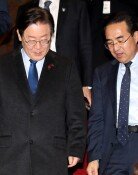Ineffective parliamentary audit sessions trouble entrepreneurs
Ineffective parliamentary audit sessions trouble entrepreneurs
Posted October. 17, 2013 10:51,
When Lim Jun-sung, CEO of Han Sung Investment Co., took the witness stand at a parliamentary audit of the administration, he sat there for three hours after answering a question from a lawmaker about the alleged price-fixing practices among Korean automobile importers, All he said was that his company had nothing to do with the automobile business. The National Assembly should have called an executive from Han Sung Motors, Han Sung Investment`s affiliate, to the witness stand.
Huh Yin-cheol, CEO of E-Mart, was asked about E-Mart Everyday, an E-Mart subsidiary for a super supermarket franchise. When he said he was not in the position to discuss another company`s business, lawmakers added Chung Yong-jin, vice chairman of E-Mart, to the list of witnesses to attend the sessions.
Kwon Oh-hyun, vice chairman of Samsung Electronics Co., and other senior executives of the electronics giant were all called in as witnesses. The lawmakers might have found it too much, agreeing with Samsung to call only Kwon to a general audit session.
Many lawmakers maintained the old practices of yelling at and humiliating witnesses rather than asking questions. Entrepreneurs at the witness stand repeatedly said "yes, sir" and "I understand, sir." They were allowed less than one minute per person to answer questions. Last year, 26 business people were called in to a parliamentary audit session but only 14 of them were asked at least one question. One lawmaker even claimed that businesspeople could use the opportunities to promote their companies. If they really used the parliamentary audit sessions to promote their businesses, would the lawmakers sit quietly and listen?
Lawmakers put 196 businesspeople on the list of witnesses this year, compared with 164 in 2012 and 80 in 2011. On Tuesday, some 40 entrepreneurs, including CEOs of Amore Pacific, LG U-Plus, Posco and Hyundai Motor Co., were called in to the National Assembly. It is true that this year`s parliamentary audit has many issues involving businesses. However, it seems that many lawmakers take advantage of the audit sessions to show off their power to corporate chief executives. Although many lawmakers take issue with big businesses` unfair treatment of smaller suppliers, they themselves are acting like an arrogant big business.
The audit sessions are for the National Assembly to inspect and criticize what the administration and state-funded organizations did for people over the last one year. Just before the opening of the sessions, both ruling and opposition party lawmakers vowed to address issues involving ordinary citizens` livelihood. It has turned out that the pledge was a mere lip service. If the Assembly fails to show some self-restraints, more and more people will agree the criticisms that the audit sessions are "useless" or "do more harm than good."




![[속보]AFP “쿠웨이트 美대사관에서 연기 치솟아”…국무부 “접근 말라”](https://dimg.donga.com/c/138/175/90/1/wps/NEWS/IMAGE/2026/03/02/133447569.1.jpg)


